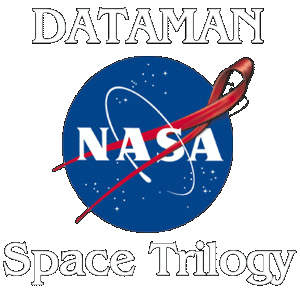Every year, the six-day period from
January 27th to February 1st marks a time of remembrance for the NASA community
and for all America, for within this brief mid-winter span our nation honors
the memory of the fallen astronauts of Apollo 1 and of the space shuttles
Challenger
and Columbia. Each of these disasters claimed the lives of
all on board and in their aftermath caused many Americans in their shock
and grief to question the necessity of manned space flight. In each
case, after much soul-searching and debate, our nation has concluded, as
did the late Gus Grissom, that, regardless of the danger, "the conquest
of space is worth the risk of life."
For the past several years I have
sought to memorialize these honored dead through a series of Web sites
that tell their stories in terms both mythical and musical. From
the pages of my 1999 "Icarus Rising" Challenger
memorial site and continuing through my 2003 "Phaeton
Descending" Columbia site to my most recent "Apollo
Burning" memorial to the astronauts of Apollo 1, the lives of these
seventeen brave men and women shine like stars in the night sky, helping
to light the way for the rest of us, the remainder of mankind, who can
as yet only dream of following in their footsteps. It is my hope
that in perusing the links to these sites you will find in the light of
their sacrifice something of the sense of awe and humility that I have
felt in contemplating the mission that they so selflessly embraced both
in life and in death.
 Challenger
STS-51L Challenger
STS-51L
January 28th, 1986
"Icarus
Rising" interprets the Challenger disaster in terms of the Greek
myth of Icarus. Although it first debuted on the Web in 1999, this
site may truly be said to have been thirteen years in the making.
On the very day of the disaster, as I spoke about it with friends and watched
the news coverage all afternoon long and into the evening, I found myself
"hearing" music in the back of my mind, but I didn't pay any attention
to it. Only once I turned off the TV well after midnight did I realize
that the song in my head was Kansas' "Icarus - Borne on Wings of Steel."
For years afterward that song and the memory of the Challenger haunted
my dreams and waking days as I sought a means of expressing for myself
and to others the complex thoughts and emotions that the song and the memory
of those seven lives lost evoked in my heart and mind. By the late
1990s and into the new millennium the World Wide Web had become the perfect
medium to express the ideas, images and music that symbolize for me the
heart of the story of the Challenger and to share them with others
the world over. "Icarus Rising"
is the fruition of that effort.
Like Icarus,
the crew of the Challenger knew that their flight was more than
merely utilitarian in nature. The presence of a civilian, a teacher,
on board underscored that theirs was a universal mission of discovery,
of learning, of furthering human knowledge beyond the limitations of the
world around us. Fittingly, the Challenger crew was the most
culturally diverse of any shuttle crew that had yet flown: male, female,
black, white, Japanese American, Catholic, Jewish, and Protestant. Together
they symbolized the best of who we are and  all
that we can become, as one laying aside their individual differences to
strive for a goal larger than themselves, and in so doing they, like Icarus,
slipped the surly bonds of Earth to touch the face of God. After
their loss, no other shuttle mission or crew would again seem so innocent,
so perfect, until... all
that we can become, as one laying aside their individual differences to
strive for a goal larger than themselves, and in so doing they, like Icarus,
slipped the surly bonds of Earth to touch the face of God. After
their loss, no other shuttle mission or crew would again seem so innocent,
so perfect, until... |
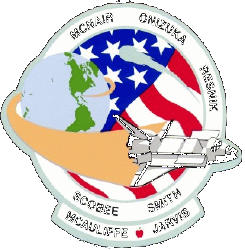 |
 Columbia
STS-107 Columbia
STS-107
February 1st, 2003
Four days after the 17th anniversary
of the Challenger disaster, I awoke to the news that NASA had lost
contact with Columbia during her reentry and that debris was raining
down over Texas and Louisiana. Like the crew of Challenger,
Columbia's
crew had been spectacularly diverse, representing many faiths and walks
of life from across the globe, and their loss was felt worldwide.
As I struggled to absorb the shock of this tragedy so soon after the September
11th, 2001, terrorist attacks, the feelings of sorrow, disbelief and emptiness
coursing through my heart and mind led me to relive the day of Challenger's
demise. I was not alone. Over the next several days Internet
traffic to my "Icarus Rising" site skyrocketed
as people the world over sought to deal with the loss of Columbia
by remembering Challenger, and I responded to this flood of grief
and remembrance by placing a note of condolence on my Challenger
page. In my heart, however, I knew that this was not enough; the
crew of Columbia deserved a memorial as fitting and as complete
as what I had done for Challenger's crew. But what?
In the days
following the fall of Columbia, I found myself thinking of the shuttle
program as the "child" of the Apollo moon program. As I perused my
mythological sources, I was attracted to the story of 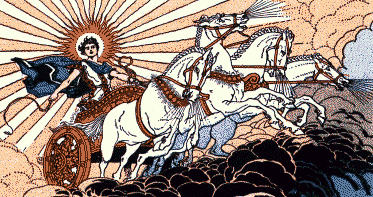 Phaeton,
the human child of the sun-god Apollo, who sets off from his home on a
fantastic journey of discovery to find his father and to claim what is
his by right of birth: the reins of the chariot of the sun. Like
young Phaeton, the crew of Columbia were not content to live ordinary
lives of comfort and safety; these "children of Apollo" instead left behind
everything they knew and loved and embraced a hope beyond this earth.
Seizing upon this idea and combining it with the Kerry Livgren song "The
Traveler," over the next couple of weeks I began developing "Phaeton
Descending" to honor the memory of the seven brave souls of the Columbia,
whose true home awaited them not on Earth but in the shining realm of Apollo. Phaeton,
the human child of the sun-god Apollo, who sets off from his home on a
fantastic journey of discovery to find his father and to claim what is
his by right of birth: the reins of the chariot of the sun. Like
young Phaeton, the crew of Columbia were not content to live ordinary
lives of comfort and safety; these "children of Apollo" instead left behind
everything they knew and loved and embraced a hope beyond this earth.
Seizing upon this idea and combining it with the Kerry Livgren song "The
Traveler," over the next couple of weeks I began developing "Phaeton
Descending" to honor the memory of the seven brave souls of the Columbia,
whose true home awaited them not on Earth but in the shining realm of Apollo.
And speaking of Apollo... |
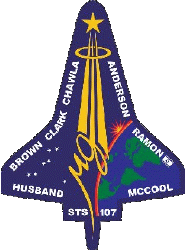
|
|
 Apollo
1 Apollo
1
January 27th, 1967
Unlike the Challenger and Columbia
disasters, I have no personal memory of the fire that killed the three-man
crew of AS-204 (later rechristened Apollo 1 in their honor) inside their
command module during a preflight test; I was only four years old when
it happened. For a long time I used my having been too young to remember
the disaster as an excuse for not putting together a memorial to those
astronauts; besides, I was too busy designing and refining my Challenger
site to shift gears and concentrate on a tragedy that I didn't even remember.
However, after Columbia fell I realized that part of our need to
remember Challenger was to make sense of Columbia's loss
in terms of the earlier one; indeed, my own purpose in memorializing Challenger
has
always been for the sake of preserving her memory not only for those who
do remember but also for the sake of those who are too young to remember...
just as I had been too young to remember the astronauts of Apollo 1.
Once I understood this, I knew that I could not in good conscience continue
to ignore their story.
In contrast
to the mythology-based formats of my Challenger and Columbia
memorial sites, "Apollo Burning" is laid
out in a storyboard style featuring images that represent both humanity's
yearning to make sense of our place in the universe and the legacy of the
Apollo moon program, a 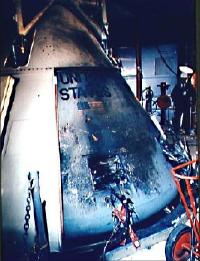 legacy
that might never have come about if the loss of Apollo 1 had been allowed
to quench the burning flame of exploration and enterprise that had driven
the program from the beginning; indeed, there would be no Challenger
or Columbia to honor today if that spirit had been extinguished
with the crew of Apollo 1. The images contained in this site are
combined with and interpreted through the lyrics and music of Kerry Livgren's
"One Dark World" to produce a psalm of wonder, lament and praise that concludes
as a prayer that we will not remain lost and alone in the darkness, that
we will one day indeed find our true home. legacy
that might never have come about if the loss of Apollo 1 had been allowed
to quench the burning flame of exploration and enterprise that had driven
the program from the beginning; indeed, there would be no Challenger
or Columbia to honor today if that spirit had been extinguished
with the crew of Apollo 1. The images contained in this site are
combined with and interpreted through the lyrics and music of Kerry Livgren's
"One Dark World" to produce a psalm of wonder, lament and praise that concludes
as a prayer that we will not remain lost and alone in the darkness, that
we will one day indeed find our true home. |
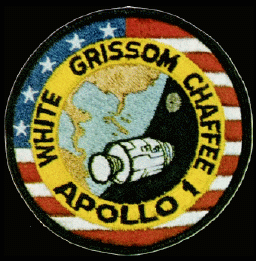 |
|
Why do this? Why expend the
time and effort to create such memorials? Indeed, what drives anyone
to remember and honor those heroes who have gone before, who valued the
goal to which they strove more than life itself? I can speak only
for myself, though even now I must do so as though seeing through a mirror
dimly. Perhaps it is a way of understanding, accepting and expressing
my sense of my own mortality; perhaps it is an affirmation of my faith
and hope within a world of darkness, sorrow and loss; perhaps it is an
expression of the personal hope that were I to be in a similar circumstance
of risk to life and limb I would respond with the same courage and selflessness
which I ascribe to them. Perhaps it is all of these. Or perhaps
it is because, when I remember these seventeen souls, the risk that they
willingly accepted and the price that they willingly paid, I imagine them
shining as stars in the heaven that they sought to embrace, smiling back
upon the Earth that they left behind and whispering in a still, small voice:
"Do this in remembrance of us."
"Red and Rover" by Brian Bassett
March 16th, 2003
Background music:
"Alpha" by Vangelis
|
